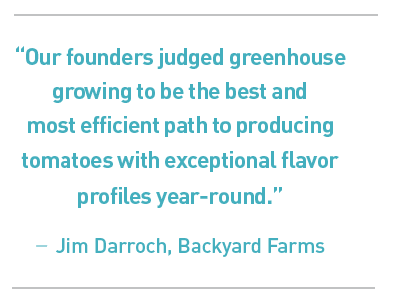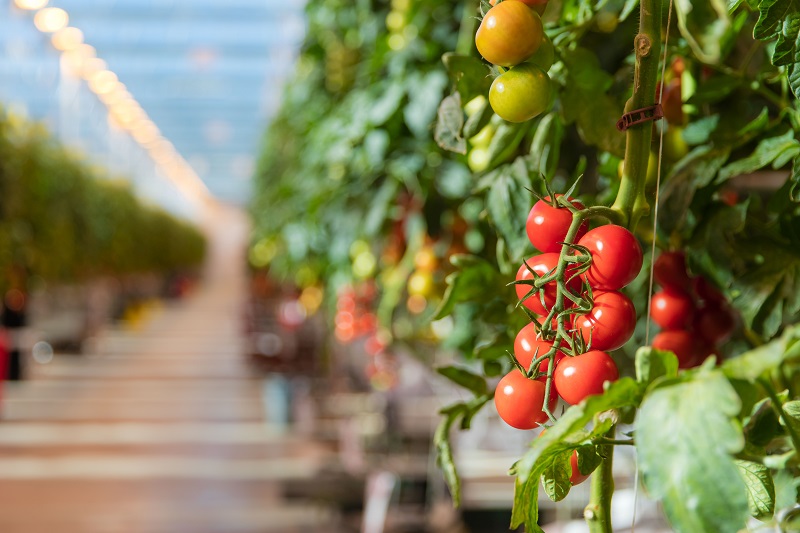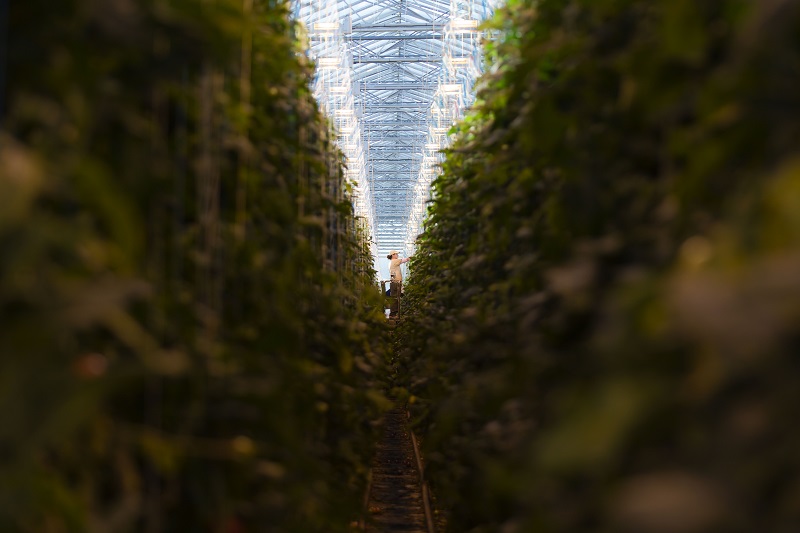
Mar 29, 2018New England’s Backyard Farms focuses on fresh
A large-scale greenhouse is giving New Englanders an option to buy locally-grown tomatoes year-round.
Backyard Farms has 42 acres of greenhouses growing tomatoes on the vine along with beefsteak and cocktail varieties. The company sells to retail and wholesale partners within a 12- hour drive of its distribution center in Madison, Maine.
The enterprise, which has been growing for more than a decade, grew out of discontent with the status quo tomatoes, said Director of Marketing Jim Darroch.
 “Backyard Farms was founded by a team of New England businesspeople who were frustrated by the lack of fresh tomatoes in winter,” he said. “They found an investment partner that shared their passion and the rest is history.”
“Backyard Farms was founded by a team of New England businesspeople who were frustrated by the lack of fresh tomatoes in winter,” he said. “They found an investment partner that shared their passion and the rest is history.”
In 2015, construction began on a 24-acre greenhouse. Backyard Farms shipped its first tomatoes on Jan. 31, 2007 and later that year broke ground on a second facility, 18 acres this time.
One-foot seedlings are transported to the greenhouse, fitted with drip tubing, and grown hydroponically in rock wool. A gutter system on the roof and a 10 million-gallon retention pond allow 98 percent of the plant’s water to come from the natural environment, according to the Backyard website.
Despite the fact that the land at the site used to be a potato farm, the company’s never tried farming outdoors.
“Our founders judged greenhouse growing to be the best and most efficient path to producing tomatoes with exceptional flavor profiles year round,” Darroch said. “In the 10 years we’ve been in business, we’ve evolved and improved our growing practices but we’ve never felt the need to change our infrastructure.”
The facility is able to grow tomatoes year-round – an accomplishment anywhere, but more so in the Atlantic Northeast where the sun-loving tomatoes don’t naturally thrive through four seasons.

“Snow, cold and darkness make the growing process challenging and more expensive,” Darroch said. “Our growing team has the skill and dedication to overcome those challenges but the real key is our relationships with retail and wholesale partners who value the superior quality of our products.”
In part because of growing a local product, Backyard is able to market its tomatoes as a premium product. The company website features a customer-friendly page that addresses frequently-asked questions about hydroponics, spot pesticide use and verification that its tomatoes are not genetically modified.
In December 2017, before the USDA clarified its stance on soilless growing as acceptable for the organic program, Darroch said the company would consider applying for an organic label if organic program were declared open to hydroponics growers.
“We’d evaluate it like we do every opportunity but at the end of the day, our customers tell us that the things they value most are our consistently great taste and the fact that we are local,” he said.
The workforce, too, is largely local.

“Backyard Farms is the largest employer in Madison and the third-largest non-service employer in Somerset County,” said Backyard Farms Vice President and General Manager Stuart Jablon. “We are proud of the wages we pay and the benefits we offer. We also work diligently to promote from within. I believe we have less non-local people on the payroll now than in any other time in our history.”
Prior to joining Backyard Farms, Jablon spent 25 years with Dole Fresh Fruit on the tropical fruit side of the business — 11 of those years were spent in Central America.
Now, Jablon said he considers it his job to make sure Backyard employees have the resources they need to maintain quality standards and live up the company vision of “being the most trusted produce brand in North America.”
Because the farm harvests year-round, Backyard has roughly 240 full-time employees. Darroch said the group has been able to fill most of the positions with traditional methods of employee referrals, print advertising and online job postings.
“We offer wages that are extremely competitive along with benefits that help us attract and retain the hard-working people we need,” Darroch said. “Living our core values and treating our people with integrity, respect, happiness, passion and humility has been essential for building the kind of culture where employees feel valued and appreciated.”
– Stephen Kloosterman, Assistant Editor
Top: An aerial view of Backyard Farms shows that local growing need not be small-scale growing.
















